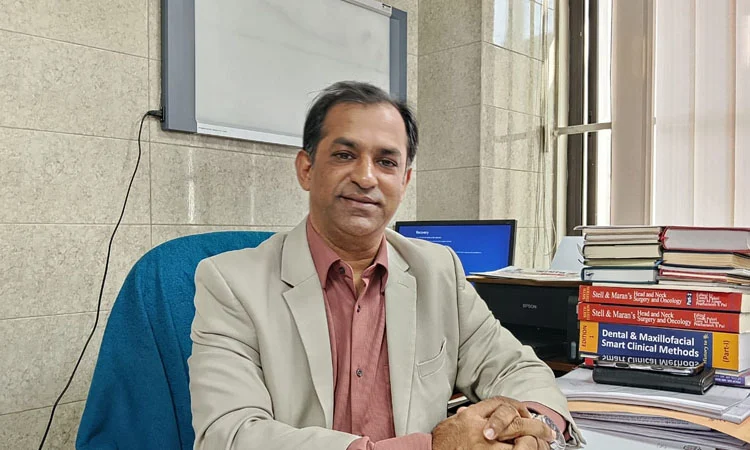Health Desk
Persistent mouth wounds caused by sharp or broken teeth, combined with widespread tobacco and alcohol consumption, are contributing to a rising risk of oral cancer in Bangladesh. Experts warn that ignoring chronic irritation in the mouth, failing to maintain oral hygiene, and delaying professional medical consultation can transform minor lesions into life-threatening conditions.
Dr. Shakhawat Hossain Sayantha, Dean of the Faculty of Dentistry and Associate Professor of Oral and Maxillofacial Surgery at Bangladesh Medical University (BMU), emphasized that while many people perceive small mouth ulcers as minor, some lesions can indicate serious underlying health issues. He explained that common aphthous ulcers, though painful, are generally harmless and resolve within five to seven days. These ulcers often arise due to stress, hormonal changes, insufficient sleep, accidental biting, or vitamin deficiencies. Mild pain-relief gels or mouthwash can provide temporary comfort, but professional evaluation is recommended if lesions persist.
Beyond simple ulcers, Dr. Sayantha highlighted the presence of premalignant lesions—early-stage abnormalities that may develop into cancer if untreated. These include leukoplakia (white patches), erythroplakia (reddish patches), lichen planus (an autoimmune condition), and oral submucous fibrosis (OSMF). OSMF, primarily caused by betel nut consumption, is particularly prevalent in Bangladesh, where betel leaf, often combined with tobacco and supari, is widely chewed. Prolonged exposure leads to fibrosis under the oral mucosa, reducing mouth opening and substantially increasing cancer risk. Lichen planus also presents higher risks for diabetic patients due to difficulties in treatment associated with uncontrolled blood sugar levels.
Dr. Sayantha identified smokeless tobacco products—including gul, jorda, sada pata, and khaini—as the leading cause of oral cancer, particularly squamous cell carcinoma. Combined use of tobacco with betel leaf, smoking, and alcohol consumption further elevates risk. Human papillomavirus (HPV), commonly linked to cervical cancer, has also been recognized as a contributing factor to oral cancer. Additionally, poor dental hygiene and chronic irritation from broken or sharp teeth can create persistent wounds that may become malignant over time. Malnutrition, particularly insufficient intake of antioxidant-rich fruits and vegetables, can exacerbate vulnerability.
He stressed the importance of early diagnosis, noting that sores lasting longer than ten days without improvement require immediate attention from qualified dental or medical professionals. Registered dental surgeons, oral and maxillofacial surgeons, or ENT head-neck specialists can conduct biopsies and other diagnostic tests. Early-stage oral cancer is highly treatable with minor surgery, while delayed cases may require extensive surgery, radiotherapy, and chemotherapy. Advanced stages can necessitate complex reconstructive surgery, increasing costs, hospital stays, and patient suffering, sometimes with fatal outcomes.
Dr. Sayantha also pointed to systemic issues in Bangladesh’s healthcare framework. Patients often first consult general practitioners who may prescribe temporary remedies without appropriate referral, delaying specialist intervention. Many turn to unlicensed practitioners, including Ayurvedic or homeopathic healers, due to fear or financial constraints. Such practices cannot treat cancer and contribute to disease progression.
He emphasized the legal requirement that only practitioners registered with the Bangladesh Medical and Dental Council (BM&DC) and holding a Bachelor of Dental Surgery (BDS) degree are authorized to provide dental care. Despite this, enforcement remains weak, and unqualified individuals continue to operate illegally, posing severe health risks to patients.
To address these challenges, Dr. Sayantha urged public awareness of available, affordable, or free dental services at BMU, government hospitals such as Dhaka Dental College Hospital, Dhaka Medical College Hospital, district health complexes, and upazila hospitals. He advised ensuring that any dental treatment provider is properly qualified, warning that reliance on quacks can result in serious oral damage and even cancer.
Through timely intervention, lifestyle adjustments, and professional care, oral cancer is largely preventable and curable, underscoring the critical need for early detection, proper treatment, and public education on oral health and tobacco-related risks.


